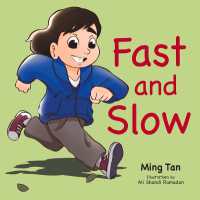- ホーム
- > 洋書
- > 英文書
- > History / American
Full Description
A compelling story of agency, survival, struggle and triumph over adversityMore than any other text, The African-American Odyssey illuminates the central place of African-Americans in U.S. history by telling the story of what it has meant to be black in America and how African-American history is inseparably woven into the greater context of American history. From Africa to the 21st century, this book follows the long and turbulent journey of African-Americans, the rich culture they have nurtured throughout their history and the quest for freedom through which African-Americans have sought to counter oppression and racism. This text also recognizes the diversity within the African-American sphere, providing coverage of class and gender and balancing the lives of ordinary men and women with accounts of black leaders and the impact each has had on the struggle for freedom. MyHistoryLab is an integral part of the Hine program. Key learning applications include Closer Looks, MyHistoryLibrary, and writing assessment. A better teaching and learning experienceThis program will provide a better teaching and learning experience-for you and your students. Here's how:Personalize Learning- MyHistoryLab is online learning. MyHistoryLab engages students through personalized learning and helps instructors from course preparation to delivery and assessment. Improve Critical Thinking-Features throughout the text encourage students to think critically about the material. Engage Students- Features such as "Voices from the Odyssey" engage students in the material. Support Instructors- A full set of supplements, including MyHistoryLab, provides instructors with all the resources and support they need. NOTE: MyHistoryLab does not come automatically packaged with this text. To purchase MyHistoryLab, please visit www.myhistorylab.com or you can purchase a ValuePack of the text + MyHistoryLab: ValuePack ISBN-10: 0205962173 / ValuePack ISBN-13: 9780205962174
Contents
In this Section:1) Brief Table of Contents2) Full Table of Contents1) Brief Table of Contents 1. Africa ca. 6000 BCE-ca. 1600 CE2. Middle Passage ca. 1450-18093. Black People in Colonial North America 1526-17634. Rising Expectations: African Americans and the Struggle for Independence 1763-1783 5. African Americans in the New Nation 1783-1820 6. Life in the Cotton Kingdom 1793-1861 7. Free Black People in Antebellum America8. Opposition to Slavery 1780-1833 9. Let Your Motto Be Resistance 1833-185010. "And Black People Were at the Heart of It" 1846-186111. Liberation: African Americans and the Civil War 1861-186512. The Meaning of Freedom: The Promise of Reconstruction 1865-186813. The Meaning of Freedom: The Failure of Reconstruction 1868-1877 2) Full Table of Contents 1. Africa ca. 6000 BCE-ca. 1600 CEA Huge and Diverse LandThe Birthplace of HumanityAncient Civilizations and Old ArgumentsWest AfricaKongo and AngolaWest African Society and CultureConclusion 2. Middle Passage ca. 1450-1809The European Age of Exploration and ColonizationThe Slave Trade in AfricaThe Origins of the Atlantic Slave TradeGrowth Of the Atlantic Slave TradeThe African-American Ordeal from Capture to DestinationAfrican Women on Slave ShipsSeasoningThe End Of the Journey: Masters and Slaves in the AmericasThe Ending of the Atlantic Slave TradeConclusion3. Black People in Colonial North America 1526-1763The Peoples of North AmericaBlack Servitude in the ChesapeakePlantation Slavery, 1700-1750Slave Life in Early AmericaMiscegenation and CreolizationThe Origins of African-American CultureSlavery in the Northern ColoniesSlavery in Spanish Florida and French LouisianaAfrican Americans in New Spain's Northern BorderlandsBlack Women in Colonial AmericaBlack Resistance and RebellionConclusion4. Rising Expectations: African Americans and the Struggle for Independence 1763-1783The Crisis of the British EmpireThe Declaration of Independence and African AmericansThe Black EnlightenmentAfrican Americans in the War for IndependenceThe Revolution and EmancipationConclusion5. African Americans in the New Nation 1783-1820Forces for FreedomForces for SlaveryThe Emergence of Free Black CommunitiesBlack Leaders and ChoicesThe War of 1812The Missouri CompromiseConclusion6. Life in the Cotton Kingdom 1793-1861The Expansion of SlaverySlave Labor in AgricultureHouse Servants and Skilled SlavesUrban and Industrial SlaveryPunishmentThe Domestic Slave TradeSlave FamiliesThe Socialization of SlavesReligionThe Character of Slavery and SlavesConclusion7. Free Black People in Antebellum AmericaDemographics of FreedomThe Jacksonian EraLimited Freedom in the NorthBlack Communities in the Urban NorthAfrican-American InstitutionsFree African Americans in the Upper SouthFree African Americans in the Deep SouthFree African Americans in the Far WestConclusion8. Opposition to Slavery 1780-1833Antislavery Begins in AmericaThe Path toward a More Radical Antislavery MovementBlack Abolitionist WomenThe Baltimore AllianceDavid Walker and Nat TurnerConclusion9. Let Your Motto Be Resistance 1833-1850A Rising Tide of Racism and ViolenceThe Antislavery MovementBlack Community SupportThe American and Foreign Anti-Slavery Society and the Liberty PartyA More Aggressive AbolitionismBlack MilitancyFrederick DouglassRevival of Black NationalismConclusion10. "And Black People Were at the Heart of It" 1846-1861The Lure of the WestFugitive SlavesThe Rochester Convention, 1853Nativism and the Know-NothingsThe Kansas-Nebraska ActPreston Brooks Attacks Charles SumnerThe Dred Scott DecisionThe Lincoln-Douglas DebatesAbraham Lincoln and Black PeopleJohn Brown and the Raid on Harpers FerryThe Election of Abraham LincolnDisunionConclusion11. Liberation: African Americans and the Civil War 1861-1865Lincoln's AimsBlack Men Volunteer and are RejectedUnion Policies toward Confederate SlavesThe Preliminary Emancipation ProclamationThe Emancipation ProclamationBlack Men Fight for the UnionThe Confederate Reaction to Black SoldiersBlack Men in the Union NavyLiberators, Spies, and GuidesViolent Opposition to Black PeopleRefugeesBlack People and the ConfederacyConclusion12. The Meaning of Freedom: The Promise of Reconstruction 1865-1868The End Of SlaveryLandThe Freedmen's BureauThe Black ChurchEducationViolenceThe Crusade for Political and Civil RightsPresidential Reconstruction under Andrew JohnsonBlack CodesBlack ConventionsThe Radical RepublicansThe Fourteenth AmendmentRadical ReconstructionThe Reaction of White SouthernersConclusion13. The Meaning of Freedom: The Failure of Reconstruction 1868-1877Constitutional ConventionsThe IssuesEconomic IssuesBlack Politicians: An EvaluationRepublican FactionalismOppositionThe Ku Klux KlanThe WestThe Fifteenth AmendmentThe Enforcement ActsThe North and ReconstructionThe Freedmen's BankThe Civil Rights Act of 1875The End of ReconstructionConclusion







